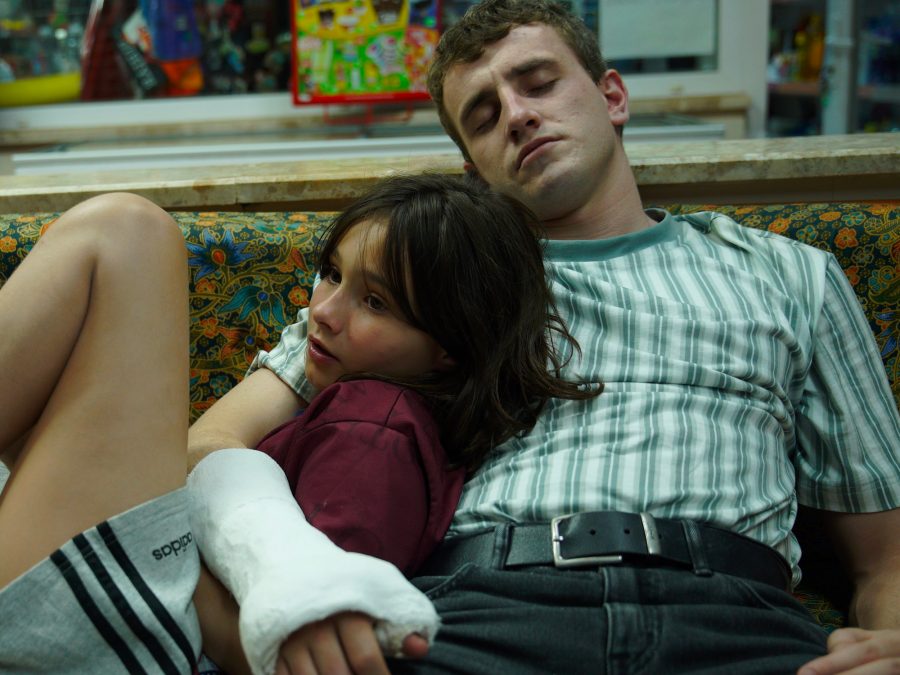The concept of trauma has us in a cultural headlock. Nowadays you can’t watch a reality competition without being confronted by someone’s heartbreaking backstory, as though their weepy confessional somehow elevates them as a worthy competitor despite having nothing to do with their skill in drag, glassblowing or pottery. Much like the TikTokers whose followings soar when they share shocking anecdotes while detachedly applying their skincare routine, cinema is transfixed by capitalising on pain, whether in the familiar territory of horror or closer to home.
In the last year in British cinema alone, we’ve had Charlotte Wells’ Aftersun, Charlotte Regan’s Scrapper and Luna Carmoon’s Hoard. All contain powerful debut performances by Frankie Corio, Lola Campbell and Saura Lightfoot Leon and Lily-Beau Leon, and all concern themselves with the nuances of grief from the perspective of young women. Another British feature debut that tackles hard-hitting subject matter is Molly Manning Walker’s How to Have Sex, which follows 16-year-old Tara’s (Mia Mckenna-Bruce) shocking experience of sexual violence while on holiday with her friends.
Much as no two instances of suffering are the same, these films are all very different, and all four filmmakers have rightfully received praise for their impressive debuts. But it does seem like a pattern is forming too fast to be catching a post-Aftersun wave of success. While it’s understandable that small personal stories with fewer characters and locations are easier to finance than grand epics or genre pieces, the British film industry nevertheless seems fascinated by new voices willing to bare their souls in the name of making a movie.

I find myself cautious of this trend because I have also had to sell my trauma. There is an unspoken expectation for many writers (particularly young women and people from other marginalised communities) to cut their teeth this way. My first pieces – and still the ones that get the most attention – are the sexy, shocking and painful ones, where I’ve had to reach inside and show the editor (and eventually the audience) all the dark sticky stuff.
Writing about your trauma, with the help of a sensitive editor, can be eye-opening. Shining light on the darker moments that isolated you means finding others who have been there too. You can be met with readers who share your pain, who thank you for articulating something they didn’t have the words for. But outlets expecting divulgence and an industry built on revealing personal essays are part of the commodification of trauma. Some creatives have to brandish their marginalisation and identity throughout their career to demonstrate to studios and financiers their right to tell a story. In contrast, others jump straight into gangster flicks, spy movies or alien invasions seemingly without having to bare their soul in the process.
Another female directorial debut that explores a woman’s traumatic childhood memory, is Censor, Prano Bailey-Bond’s 2021 debut feature, which understands the way our painful history can be packaged, commodified and weaponised against us. Censor explores exploitation and trauma in the era of the video nasty. While working for the British Board of Film Classification, Enid (Niamh Algar) views a video of her long-lost sister, triggering tragic childhood memories. Cheap gore flicks of the 80s are the horrors she scans through at work, but the Thatcherite Britain of Censor carries its own horrors, including the minor strikes, police brutality and a country in austerity. As Prano Bailey-Bond told Vulture, Censor addresses the reasons why people do terrible things: “it can come from how we’ve been treated in life and how we feel in our heads.” Censor demonstrates that the moral panic of this exploitation genre was misplaced, horror being an easy scapegoat for societal ills. But while trauma and horror are natural partners, what about the wider trend of female filmmaker debuts that focus on similar subjects?
Apart from the dead relatives and grief these films have in common, there’s more connective tissue. Each parent struggles to support their child – in Aftersun, Calum’s (Paul Mescal) willingness to purchase an expensive rug signals his mental decline, while other erratic instances during their family holiday read as more warning signs he’s not okay. Meanwhile, other children are close to falling through the cracks of failing childcare systems. It takes an avalanche of clutter to remove young Maria from an unstable home in Hoard, while Georgie in Scrapper fakes a parental presence to barely interested social services to avoid being taken into care. These are not just tales of trauma, but powerful explorations of British class structure and failings as seen through the eyes of those not yet equipped to understand the injustice.

Molly Manning Walker’s How To Have Sex has already been likened to Aftersun, in that both films follow young girls on holidays that have a tragic undercurrent. But both films also articulate ways in which society fails men. Charlotte Wells’ father figure, Calum, silently struggles with his depression, drinking and silently sobbing while his daughter sleeps, unable to reach out for help. Molly Manning Walker recognises that while men are the perpetrators and complicit bystanders of sexual violence, it’s a layered issue that requires education of both young men and women to rectify. In an interview with the Guardian, Walker stated: “It’s the way that society has brought them up. ‘Be a strong man. You’ve got to take the lead, and you’ve got to know what you’re doing.’” Alarming instances of male suicide and gendered violence are not separate issues – they are two heads of the same beast. How to Have Sex seeks to start a conversation about sexual consent, and challenge perceptions about how young men and women are socialised.
Of course there’s also a degree of autonomy here; all these debut filmmakers have fought to tell their own stories, on their own terms. We have a new generation of directors who have the language to explore personal issues in bold and brave new ways. Luna Carmoon explained to AnOther the complex cathartic process she went through writing Hoard: “I went from venom and grief and sadness to another kind of sadness, it was like the stages of grief, and then when I’d [finished] the script it was just love, it healed me.” None of these directors have been coerced into making these works that express the nuance of their individual history. Nevertheless, many young female filmmakers whose debuts centre on tragedy, whether personal or not, invite us to reflect on our own. Perhaps it’s a matter of knowing what audiences connect to.
From the council house cheap holiday resort sets to retro needle drops, all of these debuts are quintessential of a certain British childhood, and there’s definitely a nostalgic element to each. For those of us who grew up in the 90s and noughties we can see something of ourselves reflected in the grainy Mini DV camera footage of Aftersun, the lurid Malia nightlife of How To Have Sex, or Hoard’s simple but satisfying chippy tea. The audience’s pain may not match those on screen, but the specificity with which these filmmakers show their own pain invites us to trawl through our own memories. Film at its core hopes to evoke empathy from its audience, but at what point are we simply projecting our own issues onto the canvases that look similar to our childhood? At what point are we judging films by the personal experiences we project on them more than their merit? Worse still, it seems we are missing the greater issue of Britain’s underserved social and medical services because we can’t see past our tears?
The trauma trend has in some ways universalised experiences that are felt extremely differently depending on financial status and support systems. Yes, we all experience ‘trauma’ in some fashion, but the coping mechanisms we can utilise to overcome it depend largely on our position in society. The emphasis on the individual when it comes to trauma can mean we fail to recognise that mental illness is a societal issue as well as a personal one – and it’s exacerbated by a state that fails its citizens. By focusing on the pain rather than its alleviation, perhaps we aren’t focusing enough on holding the government accountable, when there has never been more need for a working welfare and healthcare system.
We take our reactionary responses as proof of a film’s poignancy, but are our tears a sign of the film’s success, or a symptom of our own desire for emotional connection? The personal is political, but when will we stop being expected to bare our souls in order to be granted entry into the discussion, and can the depiction of trauma change real-world circumstances for the better? My hope is that these new talents don’t get pigeonholed into sharing their trauma, constantly called upon to retrieve new gems from their past, but instead can be backed with funding for wildly adventurous projects that tell epic stories as well as personal ones. Similarly, aspiring filmmakers (and writers!) shouldn’t have to share their darkest secrets in order to prove their worth. But if someone feels empowered by telling their story, let’s hope doing so might inspire audiences to ask for wider change.
The post Why are so many British feature debuts about childhood trauma? appeared first on Little White Lies.
from Little White Lies https://ift.tt/AZuNRjx
via IFTTT

0 Comments